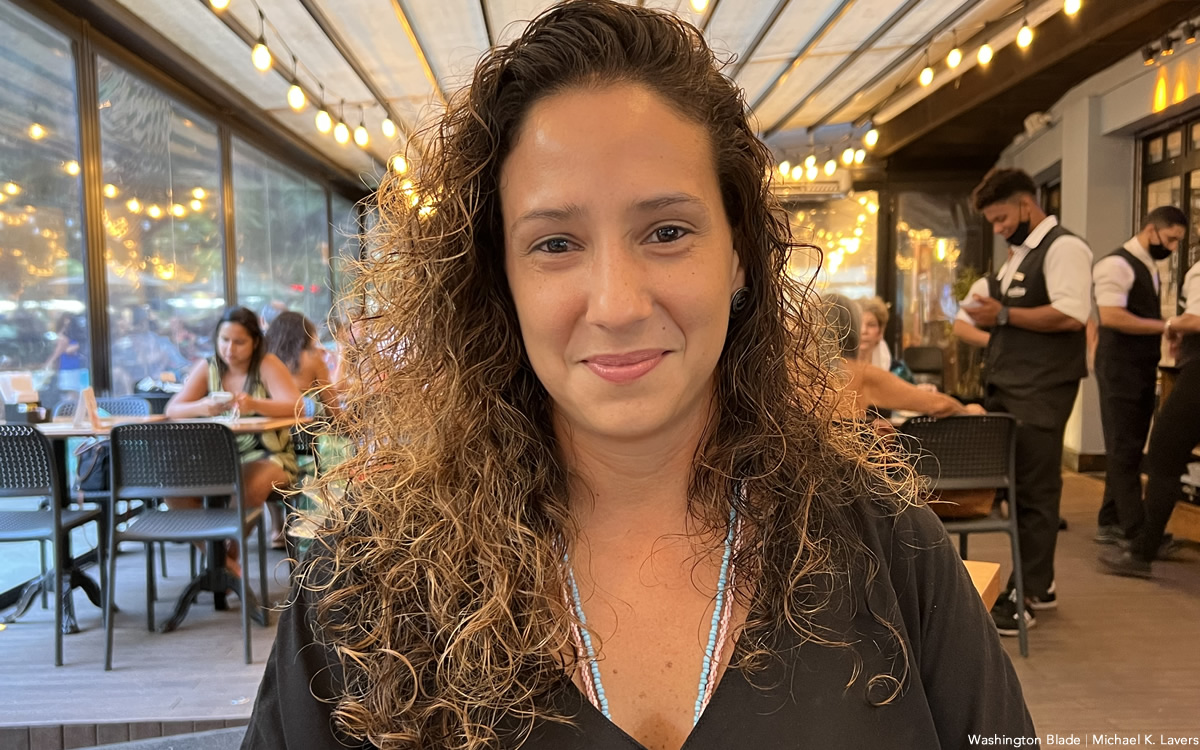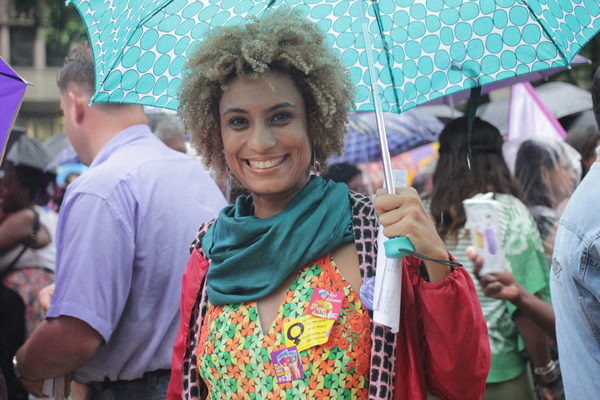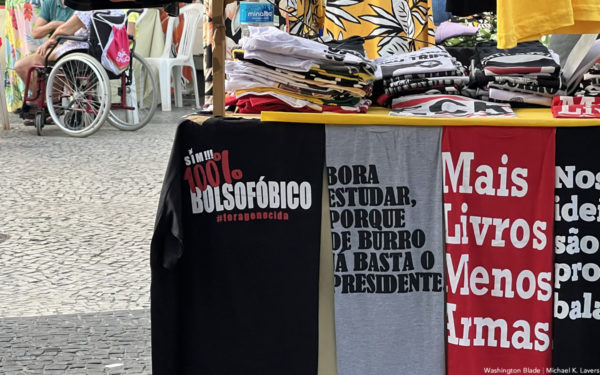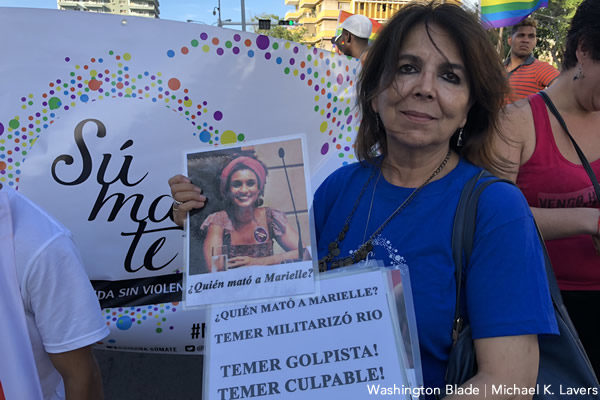World
Marielle Franco’s widow keeps her legacy alive
Mônica Benício elected to Rio de Janeiro Municipal Council in 2020

Editor’s note: International News Editor Michael K. Lavers was on assignment in Brazil from March 12-21.
RIO DE JANEIRO — March 14 marked four years since the murders of Rio de Janeiro Municipal Councilwoman Marielle Franco and her driver, Anderson Gomes, after they attended an event for Black women in the Brazilian city’s Lapa neighborhood. It remains very difficult for Franco’s widow, Mônica Benício, to discuss that day without becoming emotional.
“Before I start crying, I’ll just ask you to imagine what it is like to lose the love of your life,” said Benício on Saturday, speaking through her assistant who interpreted for her during an interview with the Washington Blade.
A tattoo of Franco’s face on Benício’s left forearm was visible throughout the interview that took place at a coffee shop near Largo de Machado in downtown Rio. A picture of Franco at a beach was also the screensaver on Benício’s smartphone.

Franco, a bisexual woman and single mother of African descent, grew up in Maré, a favela in the northern part of Rio that is close to its international airport.
Franco in 2003 began to work for now Congressman Marcelo Freixa, who is currently a member of the Brazilian Socialist Party, when he was a member of the Rio de Janeiro (State) Legislative Assembly. She coordinated its Defense of Human Rights and Citizenship Commission and worked for a number of local human rights organizations before she won a seat on the Rio Municipal Council in 2016 as a member of the leftist Socialism and Liberty Party.
Benício noted Franco received the fifth highest number of votes among the 51 candidates who ran for the Municipal Council in 2016. Only one other female candidate received more votes than Franco.
Franco, among other things, was an outspoken critic of police raids in Rio’s favelas that have left hundreds of people dead. She was a member of a Rio Municipal Council commission that sought to investigate them.
Franco four days before her murder described the Rio de Janeiro State Military Police’s 41st Battalion as “the death battalion” in response to the killings of three young men in two of the city’s favelas.
Authorities in 2019 arrested two former police officers in connection with Franco’s murder.
Benício noted the men remain in jail, but their trial has not begun.
“The struggle for justice to find out who ordered the murder and how high up they were indicates we are still far from knowing,” she said.
Ronnie Lessa, one of the main suspects, lived in the same large condominium complex in Rio’s exclusive Barra da Tijuca neighborhood in which President Jair Bolsonaro lives.
Bolsonaro, a former Brazilian Army captain who represented Rio in Congress for decades, was not president when Franco and Gomes were murdered.
Bolsonaro has strongly denied media reports that indicate Lessa visited his home before the killings. Benício referred to investigators’ claim the fact that Lessa and Bolsonaro were neighbors is “just a coincidence.”
Bolsonaro election ‘worst thing’ in Brazil for decades
Bolsonaro took office on Jan. 1, 2019. He defeated former São Paulo Mayor Fernando Haddad of former President Luiz Inácio Lula da Silva’s Workers’ Party in the second round of the country’s presidential election that took place on Oct. 28, 2018.
“It’s the worst thing that’s happened in the history of this country for decades,” said Benício.
Bolsonaro’s comments against LGBTQ Brazilians, women, indigenous people and other underrepresented groups have sparked widespread outrage. Sources in Rio, São Paulo and Salvador with whom the Blade spoke also noted Bolsonaro, who is a member of the Liberal Party, has sought to link COVID-19 vaccines to AIDS.
“It is important for us to understand that Jair Bolsonaro has been in Congress for 30 years and has made no contribution to society,” said Benício.
Benício noted Bolsonaro’s homophobic, transphobic, racist and misogynist rhetoric was “known” before he became president. Benício said it resonates with a segment of Brazilian society and has caused incidents of discrimination, harassment and violence based on race, sexual orientation, gender identity, class and other factors to increase.
“It is an absolutely despicable posture and incompatible with a posture of the president of the republic,” she said. “It does, however, resonates with sectors of society.”

Brazil’s presidential, vice presidential, congressional and state gubernatorial and legislative elections will take place on Oct. 2.
Early polls indicate da Silva is ahead of the highly unpopular Bolsonaro, although a run-off will take place if no presidential candidate receives a majority of the vote. Eduardo Leite, the governor of Rio Grande do Sul State and member of the center-left Brazilian Social Democratic Party who came out as gay last summer, is among those who are running for vice president.
Benício told the Blade that she is hopeful the election “will not be a favorable result” for Bolsonaro. Benício also acknowledged growing concerns that Bolsonaro may not accept the election results if he loses.
“Whether we can complete this electoral period within (the framework of) our democracy or if we have someone who has finally shown that he has no scruples is a real concern,” said Benício. “It doesn’t matter if he hands over that presidential sash.”
Benício elected to Rio Municipal Council in 2020
Franco’s family has created the Marielle Franco Institute that seeks to “inspire, connect and empower Black women, LGBTQIA+ people and others on the margins in order to continue moving the structures of society towards a fairer and more egalitarian world.”
Benício, who also grew up in Maré, was an architect before Franco and Gomes were killed. Benício in 2020 ran for the Rio Municipal Council as a member of the Socialism and Liberty Party, and won with nearly 23,000 votes.
Benício’s first term would have been Franco’s second.
“It was never in my personal life plan,” Benício told the Blade. “I was the partner of a lawmaker and my life was dedicated to architecture.”
Benício said the majority of her colleagues on the Municipal Council have treated her well, although some of them strongly disagree with her positions on LGBTQ rights and other issues that include support for efforts to address social and economic disparities in the city. Benício stressed she champions the same issues that Franco did.
“They already knew me as a defender of human rights,” said Benício, referring to her colleagues on the Municipal Council. “They already knew me as a feminist, a lesbian.”
Benício further stressed she remains committed to keeping Franco’s legacy alive.
“Seeing Marielle turn into a broad representative symbol of resistance, of hope, for me is the legacy,” said Benício. “Marielle’s life will not be in vain. Society will also not allow it.”

China
Female writers arrested in Chinese crackdown on gay erotic fiction
Pingping Anan Yongfu arrested last month, detailed ordeal on Weibo

On China’s Weibo, a platform akin to a digital town square, a young woman using the handle Pingping Anan Yongfu laid bare a harrowing ordeal. She was arrested and subjected to a humiliating strip search for publishing gay erotic fiction. Her raw and unsparing account exposed a broader clampdown.
Since February, at least 30 other writers — mostly women in their 20s — have shared similar stories of law enforcement raids, their lives upended for crafting “danmei,” a genre of male-male romance often laced with explicit themes, on Haitang Literature City and other platforms.
”I will never forget it — being escorted to the car in full view,” posted Pingping. “Enduring the humiliation of stripping naked for examination in front of strangers, putting on a vest for photos, sitting in the chair, shaking with fear, my heart pounding.”
A wave of legal limbo engulfs the writers, with many released on bail or awaiting trial, their fates uncertain, according to a BBC. Others remain behind bars, their detention a stark reminder of the crackdown’s reach.
Beyond those arrested, a broader net has been cast: scores of contributors to Haitang Literature City have been hauled in for interrogations, their online words now a potential liability under China’s pornography laws for producing and distributing obscene materials.
China’s pornography laws cast a long shadow over writers, with those profiting from their work facing prison terms exceeding a decade for crafting “explicit descriptions of gay sex or other sexual perversions.” Yet, heterosexual erotica often escapes such scrutiny, slipping through the cracks of enforcement. Nobel Laureate Mo Yan, whose novels brim with graphic sexual scenes, and Jia Pingwa, known for vivid depictions in works like “Abandoned Capital,” and other acclaimed writers continue to publish freely, their books lining shelves without fear of raids. This stark disparity underscores a selective crackdown, where gay erotica bears the brunt of official censure.
Beijing’s unease with the online outcry was palpable, as the trending hashtag #HaitangAuthorsArrested, which amassed more than 30 million views on Weibo, vanished abruptly under censorship’s heavy hand. Posts offering legal advice to the embattled writers were scrubbed, and a detailed report on the crackdown by Caixin, a leading Chinese news outlet, was swiftly taken offline. Writers’ accounts, including some of their pseudonymous handles, have also begun to disappear, erased from the digital landscape as authorities tighten their grip.
As her post ricocheted across China’s digital sphere, Pingping abruptly deleted it, replacing it with a brief message expressing gratitude to supporters while conceding she had broken the law. The admission, tinged with resignation, marked her final act on Weibo before she erased her account entirely, vanishing from the platform amid mounting pressure from authorities.
“Danmei,” a vibrant subgenre of Chinese fiction, centers on romantic and often sexually explicit relationships between men, captivating a largely female readership through its blend of emotional depth, fantasy, and forbidden desire. Rooted in Japanese “yaoi” or “boys’ love,” but distinctly shaped by Chinese cultural sensibilities, it flourishes on Haitang Literature City and JJWXC and other platforms where writers craft sprawling tales of historical, fantastical, or modern love that often laced with themes of power and sacrifice.
Despite its popularity — bolstered by blockbuster adaptations like “The Untamed,” which amassed millions of fans — “danmei” faces intense scrutiny in China, where authorities deem its explicit content “obscene” under vague pornography laws. This tension reflects a broader cultural clash: while “danmei” offers a space for exploring queer identities and challenging traditional gender norms, its underground allure draws both devoted fans and the wary eye of censors seeking to uphold conservative values.
A sweeping crackdown in late 2024 saw Chinese authorities prosecute roughly 50 “danmei” writers, ensnaring them in a legal dragnet under the country’s 2004 obscenity laws. Among them, Yuan Shang Bai Yun Jian, a prominent author who earned 1.85 million yuan ($250,874.58) from her work on Haitang Literature City, was sentenced to nearly five years in prison, her success weaponized as evidence of “obscene materials for profit.”
The harsh penalties, which outstrip those for some violent crimes, sparked outrage online, with netizens decrying the disproportionate punishment for crafting stories that, while explicit, harmed no one.
Chinese media regulator banned ‘danmei’ TV dramas in 2022
Humiliation washed over Pingping as law enforcement stormed into her college classroom, recounted a writer using the Weibo handle “Tianxia Ju Da Bingyuan” or “The World Is a Vast Asylum.” Dragged from her lecture under the stunned gazes of her peers, she endured a public spectacle as officers trailed her to her dormitory, rifling through her belongings in a search for evidence of her “danmei” stories, leaving her exposed and her privacy shattered.
“Danmei” novels, centered on male-male romance have spurred numerous Chinese television dramas, but state censorship has sharply reduced their output. A 2021 Sixth Tone report identified more than 60 “danmei”-based dramas in development or slated for release, involving actors who include Chen Feiyu and Fan Chengcheng. Many of them, however, were halted following the 2022 National Radio and Television Administration ban on such adaptations.
MyDramaList records 16 aired series, including “The Untamed” (2019) and “Word of Honor” (2021), each with 30–50 actors, totaling approximately 480–800 performers. Lead actors, including Xiao Zhan and Wang Yibo, earned $1–3 million per series, per The China Project, while others made $50,000–$100,000, though precise figures remain limited due to private contracts. The 2021 “Internet Clean-up Campaign” and continued restrictions have significantly curbed new “danmei” adaptations.
United Nations
UN Human Rights Council extends LGBTQ rights expert’s mandate
29 countries voted for resolution

The U.N. Human Rights Council on Monday extended the mandate of the United Nations’ independent LGBTQ rights expert for another three years.
The resolution passed with 29 countries (Albania, Belgium, Bolivia, Brazil, Bulgaria, Chile, Colombia, Costa Rica, Cuba, Cyprus, the Czech Republic, the Dominican Republic, France, Georgia, Germany, Iceland, Japan, Kenya, the Marshall Islands, Mexico, the Netherlands, North Macedonia, South Korea, Romania, South Africa, Spain, Switzerland, Thailand, and Vietnam) voting for it and 15 countries (Algeria, Bangladesh, Burundi, China, Cote d’Ivoire, Democratic Republic of Congo, Ethiopia, Gambia, Indonesia, Kuwait, Malawi, Maldives, Morocco, Qatar, and Sudan) voted against it.
Benin, Ghana, and Kyrgyzstan abstained.
The U.S. in February withdrew from the Human Rights Council. The Trump-Pence administration in 2018 pulled the U.S. from it. The U.S. in 2021 regained a seat on the Human Rights Council.
Graeme Reid has been the UN’s independent LGBTQ rights expert since 2023. The South African activist, among other things, previously ran Human Rights Watch’s LGBT Rights Program.

South Africa National Assembly Speaker Thoko Didiza on June 17 swore in lesbian feminist Palomino Jama as a new MP.
Jama joins other LGBTQ legislators — including Public Works and Infrastructure Minister Dean Macpherson; Forestry, Fisheries and the Environment Minister Dion George; and Deputy Women, Youth, and Persons with Disabilities Minister, Steve Letsike.
Jama said she will work hard and excel as MP.
“What a great moment to be alive. Thank you youth of 1976, thank you Simon Nkoli, Phumi Mthetwa, Paddy Nhlaphos, Vanessa Ludwig, and others for what you did for the LGBTI people in the 80s and 90s. Lastly, for the fierce fist of the Jamas to always hit where it matters for the people of this country,” said Letsike.
Embrace Diversity Movement, a local LGBTQ organization, said Jama’s inauguration came at an appropriate time, during Pride month.
“Her swearing-in took place during a month of profound significance in June, which marks both international Pride Month and Youth Month in South Africa,” said the group. “Palomino is a seasoned queer activist and dedicated community builder with a distinguished record of leadership and service.”
“The EDM proudly supports Palomino in her deployment to parliament, her presence meaningfully advances youth and queer representation in public office,” added the Embrace Diversity Movement. “We are confident that she will serve the people of South Africa with integrity, courage, and distinction.”
South Africa is the only African country that constitutionally upholds LGBTQ rights. There are, however, still myriad challenges the LGBTQ community faces on a daily basis that range from physical attacks to online abuse.
Letsike in May faced a barrage of online attacks after she released a scathing statement against popular podcaster Macgyver “MacG” Mukwevho, who during a podcast episode in April insinuated that the reason behind popular socialite Minnie Dlamini’s “unsuccessful” relationships were probably due to the bad odor from her genitals.
Letsike, who viewed MacG’s comments as offensive, called for the podcaster to be summoned before parliament’s Portfolio Committee on Women, Youth, and Persons with Disabilities and criticized the local television station that aired the podcast.
X users and other social media subscribers bombarded Letsike with anti-lesbian comments. She, however, was unphased.
Letsike continues to face anti-lesbian comments, even though MacG apologized and the television station on which his podcast had aired cancelled its contract with him.
-

 U.S. Supreme Court5 days ago
U.S. Supreme Court5 days agoSupreme Court to consider bans on trans athletes in school sports
-

 Out & About5 days ago
Out & About5 days agoCelebrate the Fourth of July the gay way!
-

 Virginia5 days ago
Virginia5 days agoVa. court allows conversion therapy despite law banning it
-

 Obituary5 days ago
Obituary5 days agoLongtime DC resident Thomas Walsh dies at 87











